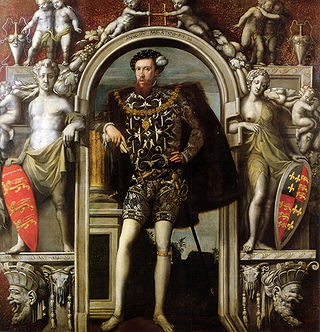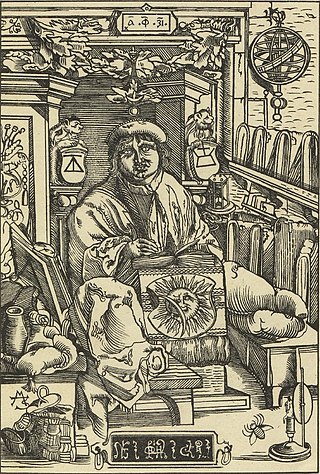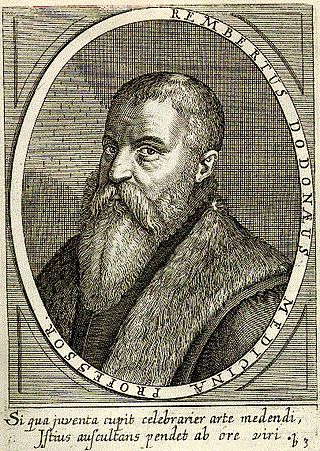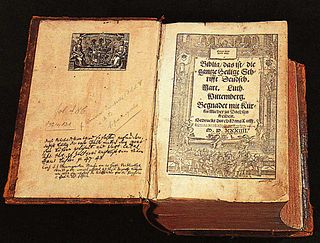Related Research Articles

Year 1522 (MDXXII) was a common year starting on Wednesday of the Julian calendar, the 1522nd year of the Common Era (CE) and Anno Domini (AD) designations, the 522nd year of the 2nd millennium, the 22nd year of the 16th century, and the 3rd year of the 1520s decade.
William Tyndale was an English Biblical scholar and linguist who became a leading figure in the Protestant Reformation in the years leading up to his execution. He translated much of the Bible into English, and was influenced by the works of prominent Protestant Reformers such as Martin Luther.
The Reformation, also known as the Protestant Reformation and the European Reformation, was a major theological movement or period or series of events in Western Christianity in 16th-century Northwestern Europe that posed a religious and political challenge to the papacy and the authority of the Catholic Church. Towards the end of the Renaissance, the Reformation marked the beginning of Protestantism and in turn resulted in a major schism within Western Christianity.

Henry Howard, Earl of Surrey, KG was an English nobleman, politician and poet. He was one of the founders of English Renaissance poetry and was the last known person to have been executed at the insistence of King Henry VIII. His name is usually associated in literature with that of the poet Sir Thomas Wyatt. Owing largely to the powerful position of his father Thomas Howard, 3rd Duke of Norfolk, Henry took a prominent part in court life, and served as a soldier both in France and in Scotland. He was a man of reckless temper, which involved him in many quarrels, and finally brought upon him the wrath of the ageing Henry VIII. He was arrested, tried for treason and beheaded on Tower Hill.

The Ninety-five Theses or Disputation on the Power and Efficacy of Indulgences is a list of propositions for an academic disputation written in 1517 by Martin Luther, then a professor of moral theology at the University of Wittenberg, Germany. The Theses is retrospectively considered to have launched the Protestant Reformation and the birth of Protestantism, despite various proto-Protestant groups having existed previously. It detailed Luther's opposition to what he saw as the Roman Catholic Church's abuse and corruption by Catholic clergy, who were selling plenary indulgences, which were certificates supposed to reduce the temporal punishment in purgatory for sins committed by the purchasers or their loved ones.

The Bible has been translated into many languages from the biblical languages of Hebrew, Aramaic, and Greek. As of November 2024 the whole Bible has been translated into 756 languages, the New Testament has been translated into an additional 1,726 languages, and smaller portions of the Bible have been translated into 1,274 other languages according to Wycliffe Global Alliance. Thus, at least some portions of the Bible have been translated into 3,756 languages.
This article presents lists of literary events and publications in the 16th century.
This article contains information about the literary events and publications of 1585.
This article contains information about the literary events and publications of 1557.
This article contains information about the literary events and publications of 1526.
This article contains information about the literary events and publications of 1520.
This article contains information about the literary events and publications of 1502.

Francysk Skaryna was a Belarusian humanist, physician, and translator. He is known to be one of the first book printers in the Grand Duchy of Lithuania and in all of Eastern Europe, laying the groundwork for the development of the Belarusian izvod of the Church Slavonic language.

Rembert Dodoens was a Flemish physician and botanist, also known under his Latinized name Rembertus Dodonaeus. He has been called the father of botany. The standard author abbreviation Dodoens is used to indicate this person as the author when citing a botanical name.

Belarusian culture is the product of a millennium of development under the impact of a number of diverse factors. These include the physical environment; the ethnographic background of Belarusians ; the paganism of the early settlers and their hosts; Eastern Orthodox Christianity as a link to the Byzantine literary and cultural traditions; the country's lack of natural borders; the flow of rivers toward both the Black Sea and the Baltic Sea; and the variety of religions in the region.
Architrenius is a medieval allegorical and satirical poem in hexameters by Johannes de Hauvilla. The poet was born in about 1150 and died after 1200, and dedicated the work to "Gualtero, archepiscopo Rotomagensium". The work was popular among the humanists of the 16th century, perhaps as much for an allegorized but frank description of feminine "charms" in the last section, as for anything else. "Architrenius" is also the name of the poem's protagonist.

The Luther Bible is a German language Bible translation by the Protestant reformer Martin Luther. A New Testament translation by Luther was first published in September 1522; the completed Bible contained 75 books, including the Old Testament, Apocrypha and New Testament, which was printed in 1534. Luther continued to make improvements to the text until 1545. It was the one of first full translations of the Bible into German that used not only the Latin Vulgate but also the Greek.

Martin Luther was a German priest, theologian, author, hymnwriter, professor, and Augustinian friar. Luther was the seminal figure of the Protestant Reformation, and his theological beliefs form the basis of Lutheranism. He is widely regarded as one of the most influential figures in Western and Christian history.
Nationality words link to articles with information on the nation's poetry or literature.
The year 1554 CE in science and technology included a number of events, some of which are listed here.
References
- ↑ "Ilya Lemeškin. The Prague Bible of 1488 and The Ruthenian Bible of Francysk Skaryna. Localization of the Printing House | Laboratory of Francysk Skaryna Studies". Skaryna. 2018-01-10. Retrieved 2022-09-04.
- ↑ "Review of Architrenius by Johannes de Hauvilla, translation by Walter Weatherbee". The Review of English Studies . 48 (189). Oxford University Press: 79. 1997. Archived from the original on 2018-12-11. Retrieved 2009-07-26.
- ↑ Mew, Joseph (1882). "Machiavelli's 'Golden Ass'," The Gentleman's Magazine, Vol. CCLII, pp. 104–115.
- ↑ Brecht, Martin (1985) [1981]. Sein Weg zur Reformation 1483–1521[Martin Luther: His Road to Reformation 1483–1521] (in German). Translated by James L. Schaff. Minneapolis, MN: Fortress. pp. 190–192. ISBN 978-0-8006-2813-0. OCLC 985533561.
- ↑ Carlos Ferrer Plaza; Joelma Santana Siqueira (1 December 2015). Escrever, editar, publicar e ler: Colóquio internacional de literatura Íbero-americana. CILIBAM. p. 110. ISBN 978-85-8179-088-6.
- ↑ Constantine Christopher Stathatos (2001). A Gil Vicente Bibliography, 1995-2000. Edition Reichenberger. p. 15. ISBN 978-3-935004-31-2.
- 1 2 Kurian, George Thomas (2003). Timetables of World Literature. New York: Facts on File Inc. ISBN 0-8160-4197-0.
- ↑ Trager, James (1979). The People's Chronology . New York: Holt, Rinehart and Winston. ISBN 978-0-03-017811-5.
- ↑ Florkin, Marcel (2008). Dodoens (Dodonaeus), Rembert . Retrieved 3 November 2017.
{{cite book}}:|website=ignored (help) - ↑ Walter William Rouse Ball (1893). A Short Account of the History of Mathematics. Macmillan. p. 230.
- ↑ Henry Howard, Earl of Surrey (17 November 2013). Delphi Complete Works of Henry Howard, Earl of Surrey (Illustrated). Delphi Classics. pp. 166–. ISBN 978-1-909496-43-9.
- ↑ Italian Journal. Italian Academy Foundation. 1989. p. 34.
- ↑ "Tra Medioevo en rinascimento". Poeti di Italia in Lingua Latina (in Italian). Archived from the original on 2024-05-24. Retrieved 2009-05-14.